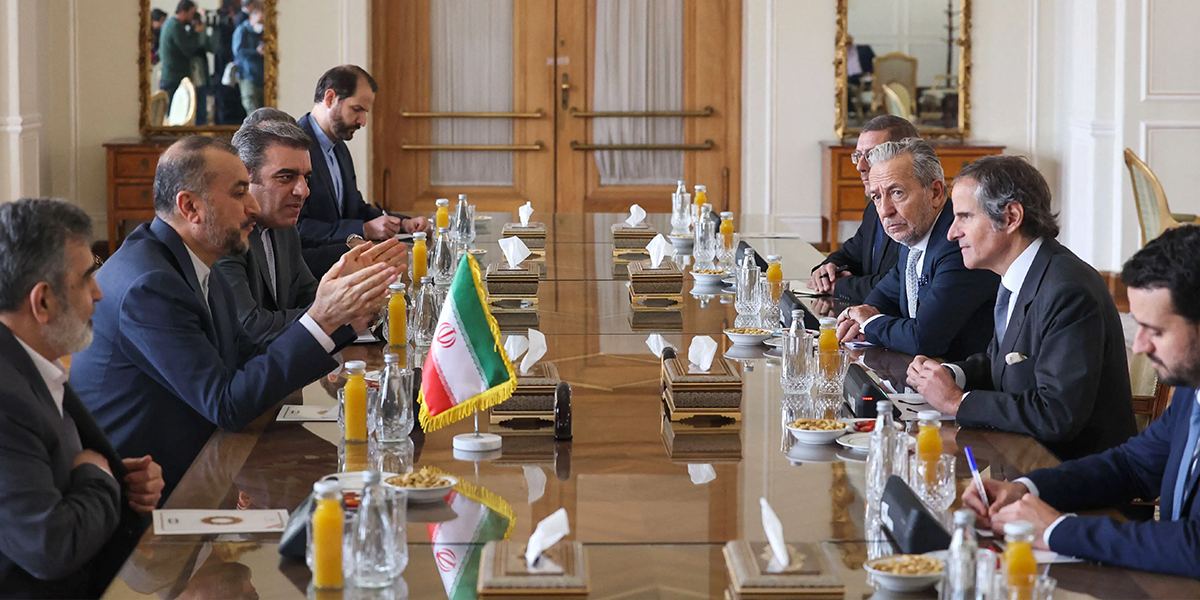We assess that there is more than an even chance that the US and Iran will reach an informal understanding on Iran’s nuclear programme in the coming weeks.
This assessment was issued to clients of Dragonfly’s Security Intelligence & Analysis Service (SIAS) on 30 June 2023.
- There appears to be a reasonable chance of an informal deal between Iran and the US on Iran’s nuclear programme in the coming weeks
- Recent press reports as well as goodwill actions by both Iran and the US suggest that they are discussing a deal that would be a limited and unwritten understanding
- Even an informal agreement of this kind would probably lead to a limited improvement in the security of navigation in the Gulf, with attacks on merchant vessels becoming less frequent
Talks between Iran, the US and regional actors have occurred over the past few months. Details of these in press reports suggest that any deal would be unlikely to involve a full lifting of US economic sanctions on Iran and a complete reduction of Iran’s uranium enrichment, but it would keep minimum international oversight over Iran’s programme. Its most immediate impact would, in our analysis, be improved security in Gulf waters.
An unwritten understanding
There has been significant positive regional diplomatic activity over the past few months over Iran’s nuclear programme. The US and Iran reportedly held indirect talks in Oman, while Iranian officials met with their EU counterparts in Qatar to discuss the nuclear file. Western countries and Iran have also recently shown signs of goodwill. The IAEA recently confirmed that Iran has re-installed cameras at nuclear sites; Iran previously removed them. Earlier in June, the US reportedly also waived some sanctions on Iran by allowing Iraq to pay outstanding debts to Tehran.
An unwritten understanding between Iran and the US appears to be the possible if not probable outcome of these talks. Rather than a signed formal deal, recent regional and international press reports suggest that the parties are moving towards an understanding largely based on mutual goodwill. According to several usually reliable news outlets (although we have not been able to independently verify them), it would limit Iranian uranium enrichment to 60%, and involve the release of some US prisoners by Iran. Additionally, the US would not impose new sanctions on Iran and issue waivers for countries to release frozen Iranian funds in exchange.
A limited de-escalatory trend
Maritime security in Gulf waters would probably improve in the coming months as a result of such a deal. Press reports suggest that the US and Iran, and regional actors, are discussing some limited de-escalatory measures as part of the new agreement, including in maritime security. Iran-linked attacks on merchant vessels in the Gulf are a key concern for the US and Saudi Arabia; there have been 15 incidents over the past two years, according to US data. Prince Faisal, governor of Medina province, also recently said that his country aims to cooperate with Iran to address ‘the security of maritime navigation’.
Gulf countries seem keen on scaling up their role in regional stability as well. The UAE, Oman, Kuwait, and Qatar have all reportedly shown interest in working towards the security arrangements associated with the deal. Press reports recently suggested that there are ongoing talks to establish a regional maritime monitoring mechanism to ensure security in Gulf waters, involving Gulf countries and Iran.
New understanding fragile
Iran, pro-Iran groups and the US would probably resume hostile activities at sea in the event that the new understanding fails. The reportedly unwritten nature of an accord means that it could be reversed anytime, with little notice. Incidents at sea appear to be connected to talks around Iran’s nuclear programme. Both the US and Iran have used these tactics to influence the course of negotiations. Based on our monitoring, there were 13 attacks on merchant vessels in 2021 (when talks resumed), four in 2022, and six so far in 2023. These mainly include seizures of commercial vessels by Iranian security forces and the US Navy.
Hostile actions between Iran and Israel will remain probable irrespective of this new accord. Israel has been very critical of any agreement with Iran on its nuclear programme in the past. The Israeli prime minister recently reiterated his long-held stance that Israel will ‘block Iran’ in the region regardless of any new deal. This is mainly because Israel’s threat perception is heightened when it comes to Iran. Israel is capable of conducting unilateral actions to degrade Iran’s military and nuclear assets. These include sabotage, low-flying armed drones, as well as air strikes against Iranian assets in Iran and Syria.
Proxies in the region, such as the Houthis in Yemen and pro-Iran militias in Iraq, are also likely to continue to conduct hostile activities irrespective of the new understanding. This is mainly because these groups have their own objectives to counter Western, in particular US, interests in the region. The Houthis reportedly carried out an armed drone attack against an oil terminal in the Gulf of Aden in November last year. Pro-Iran groups in Iraq issue threats against US assets and interests in Iraq on a monthly basis.
Image: Iranian Foreign Minister meets with IAEA chief in Tehran on 4 March 2023. Photo by Atta Kenare/AFP via Getty Images.



